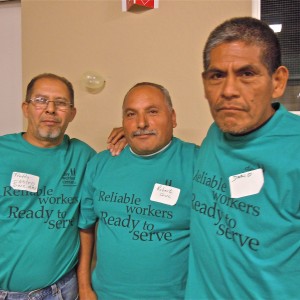
Community Engagement Project:
LifeMoves Organization- Day Worker Center of Mountain View
Group: Jade Rosa, Allie Valladarez, Marco Tovar, Thalia Martinez, Babe Faalata

My group was able to secure our community partner through a meeting on 3/5/2016 with the Executive Director of The Day Worker Center of Mountain View. At the meeting, the director Maria explained the company's goals and mission. She provided my group members with information about the history and need behind the organization. It was decided that as volunteers, we would be going out to the community and recruit new laborers because she said that it has been the first time since they opened that they have more job positions than workers. To keep the organization running smoothly, the director needs to maintain professional relationships with the companies that supply jobs for the workers. This means it is important to have enough 'employees' to serve the needs of the 'employers' and this is where we come in to help. We have decided to go out to certain locations where day laborers seek work and inform them about the center. We will be creating a flyer in both English and Spanish that we can provide to the workers and answer any questions they may have about how the program works. Our group got together on Wednesday 3/9/2016 to follow up on progress, discuss our schedules and individual contributions to the project. We are awaiting some further instructions from Maria so we don't 'jump the gun'. It's hopeful that she will provide us with some locations where we can scout for workers, more details on exactly how the process works like how/when workers are paid, and confirm the information she wants us to include on the flyer. We are going to draft the flyer up and email it to her for approval. I also thought it would be a cool idea to create some training materials for future volunteers who will help with recruiting.
Our group had been a little stressed with all of the obstacles that were encountered which held us back from starting our community service project but, we are glad to say things are progressing much more smoothly and we are feeling positive as we proceed. Personally, I have spent my time communicating through email and in person, researching our community partner, writing blog/journal entries, and attending our group meetings to discuss our options or create presentation materials. I have also begun to put together the Worker Recruiter flyer we will be using when we talk to laborers in the community about the center and how they can empower themselves.
Overall, it seems that our team is getting the engine going and we are on our way to some exciting community engagement! I am happy to be involved with the community and am learning so much more about the challenges Day Laborers face.
The Day Worker Center of Mountain View is a 501(c)3 non-profit organization serving the communities surrounding Mountain View, Los Altos, and Sunnyvale. The Center was established in 1996 by leaders from local businesses, churches, and the community to provide job-matching services for hundreds of local homeowners and businesses annually.
The Center is led by a full-time Executive Director,
María Marroquín, a recipient of numerous awards for her work at the Center. Organizational guidance comes from a
Board of Directors composed of community and business leaders and representatives from the day laborer community. In addition, much of the day-to-day worker-related activities at the Center is managed by
the Workers' Commission, composed of 8-10 current and past users of the Center.
In addition to supporting the day laborer population, the Center contributes to our community in the following ways:
- provides a location for service providers, such as Community Services Agency, to reach their clients
- reaches out to day laborers soliciting work on the streets to inform them about the center's services
- provides worker-led community service
- monthly trash pickup on local streets
- donates hand-made blankets for premature infants at Lucille Packard Children's Hospital at Stanford
- helps coordinate and participate in community events, sponsored by Rotary Club, Run for Zimbabwe, Mountain View Educational Foundation,etc.
- Hosts a blood drive four times a year
- helps senior citizens with community gardens
- provides English as a Second Language (ESL) classes to the workers, facilitating interactions with employers and participation in local culture
- serves as a critical conduit for the city agencies and services to communicate with the Latino community
- decreases the number of workers soliciting employment on the streets
- reduces complaints in the areas where workers congregate, in turn reducing the number of calls to Police Departments
- reduces strain on local emergency rooms by providing free weekly medical visits by the Gardner Health Services Mobile Medical van
- Time Sheet Status -
Total Time Invested: 16 hours
Time with CP: 0 hours




